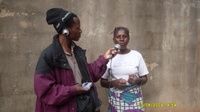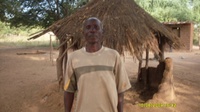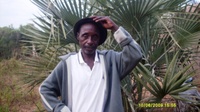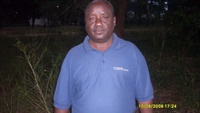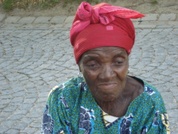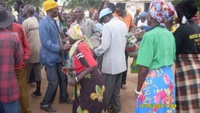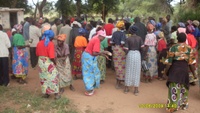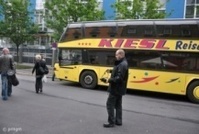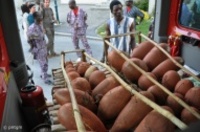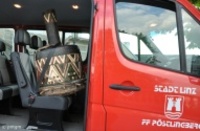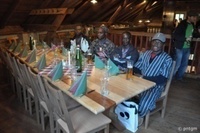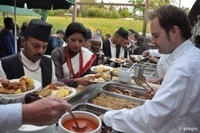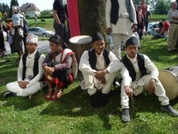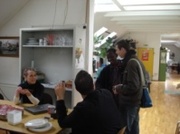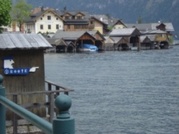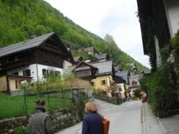Maliko: Parade Travelogue
- Details
- Created: Sunday, 06 September 2009 14:12
A report from Josiah Moyo who accompanied the Maliko group of musicians from Sinazongwe / Zambia on their journey to Austria to attend the Parade at Linz 09: "Ich war dabei" which means " I was part of it" and was written on the Linz09 T-shirts.
He writes about their astonishment: "they did not think that blowing a horn ('kusiba nyele' in local Tonga language) can take a person so far".
See the many pictures enclosed in the report and read the accounts of participants. Read also feedback from other groups of musicians participating: http://www.linz09.at/parade-blog
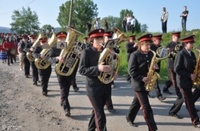
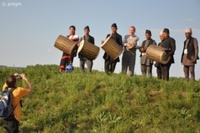
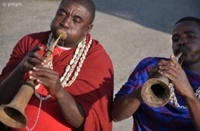
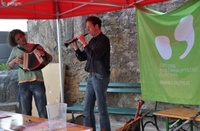
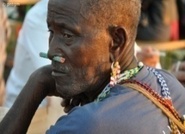
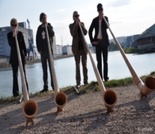
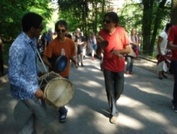
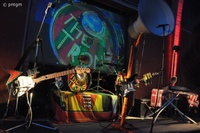
ICH WAR DABEI
The long awaited trip after some years of speculations come to months, then weeks followed by days, the last was hours then departure for the long awaited journey by the Simonga – Maliko group of Zimbabwe and Zambia bridged by Tonga.Online after many years of separation after the damming of Lake Kariba Dam.
The trip to Austria which was thought to be a non-starter to some of the members in the group came to eject sense on the day of collecting passport, still then the uncertainty was there. As the Sinazongwe community, they did not think that blowing a horn (“kusiba nyele,” in local Tonga language) can take a person so far. It was a different picture with the Simonga group because they had been in Austria before for the same function.
People had to spend a night at the Chief's palace as we were to start at 03:00hrs (3 am). A stop over in Kalomo, a town 162Km from Sinazongwe, was for refuelling. Then Just 10Km from this town we had a tire puncture to the front left wheel of the bus to which we managed to change it in 10 minutes and then we were back on the road and managed to reach Livingstone at 10:00hrs (10am). We had to drive straight to the border as per arrangement. Unfortunately we could not meet the team leader from the Zimbabwean group Simonga. After waiting for some hours we went to town to have lunch. At 14:00hrs we crossed the Zambian border to the Zimbabwean side where we were marooned for 2 hours because of the procedures which were not pre-arranged. We met our friends who had already reached by 8:00hrs (am) the evening before, a strategic plan for the following day was made which was to start at 7:30hrs.
At 730hrs we were on the bus going to the starting point at a place called Chinotimba township. We reached there and met Joachim and Jimmy. When the Ngoma buntibe started the performance, young and old come to brace the occasion.
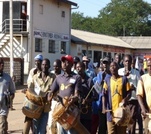
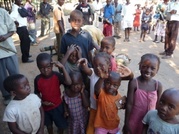
The match started with an escort from the Zimbabwe Police at Chinotimba bar down to the VicFalls main street, the onlookers joined the match as we marched down to the VicFalls town centre.
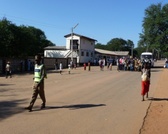
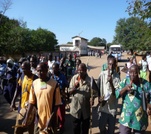
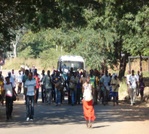
Workers had to come outside to see what the noise was, just to find that it was their indigenous traditional music, others had to join with their broomstick dancing expressing their happiness.
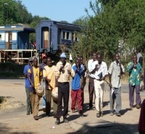
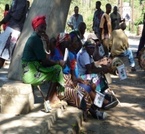
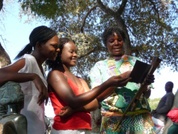
We branched off to Chaka’s Den for a lay-by and relaxed for 20 minutes. From this point we proceeded to the border. Before leaving the Zimbabwean side, water was drawn from the Zambezi River, then we crossed the bridge into the Zambian border and we were well welcomed at the check point.
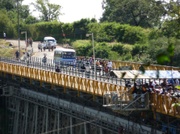
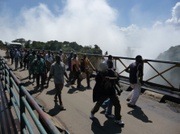
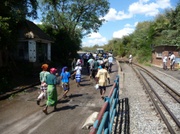
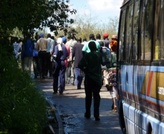
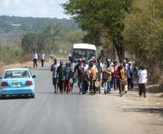
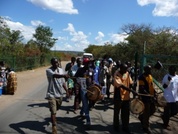
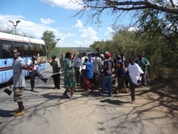
The officers asked us to perform while they process the passports, others come out to have a glimpse of the performances.
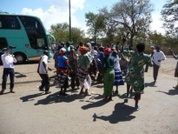
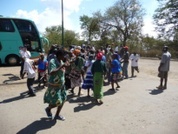
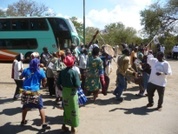
After been cleared, we performed outside before leaving to a point of drawing water from the Zambezi River on the Zambian side.
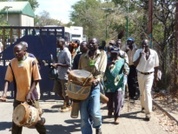
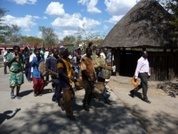
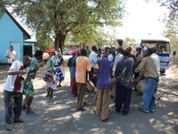
After water was drawn, we drove to the last starting point which was about a 1km before the finishing point. Here people were relaxing while waiting for a Police escort.
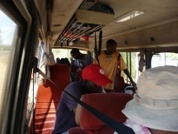
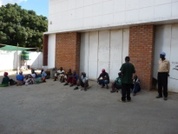
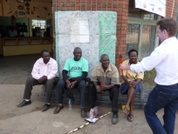
When the escort from the Zambian Police come we marched through the civic centre to the main Post office, in the town centre of Livingstone, which was our last point for activity.
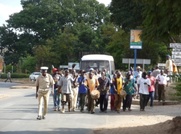
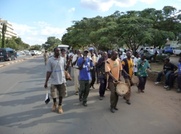
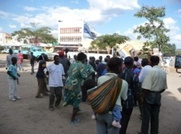

A quick shopping was done in town; from there everybody went to Queens Hotel where we lodged for the night.
The following day in the morning was to finish up the requirements and confirmation of the tickets and buying mealie meal to take with. At 10:30hrs everybody was ready and waiting anxiously for the departure time to the airport.
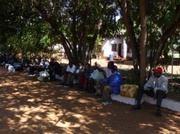
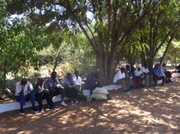
Mixed feelings were filled in each one’s thought, with speculations of the flight, the stories of vomiting, nausea, the inconvenience of the flight, many stories talked about aeroplanes before leaving home were being digested.
As time ticked, after arriving at the airport, finally queuing for checking in, it was another experience for many people who at their old age had to experience it was now wait and see what comes next.
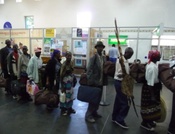
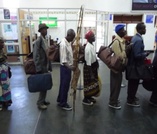
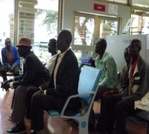
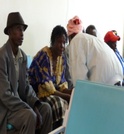
The last thing was our luggage to be checked in, the drums and mealie meal and the plane was delayed for some 10minutes because of the mealie meal which was not packed to their specification, but they understood us and promised to send a fax to South Africa not to trouble us over the mealie meal
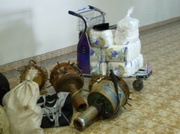
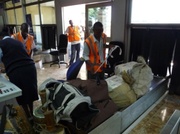
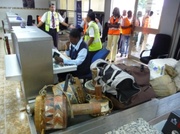
Finally we were on the big bird to be flown outside our country to a foreign country. Our destination being foreign but we were not to be foreigners because of people we were going to, some we had known them already at home.
At 15:25hrs we were disembarking from the British airways at Oliver Tambo International airport en route to Switzerland. Unfortunately we found there was a strike for catering services; as a result all the flights were delayed that day.
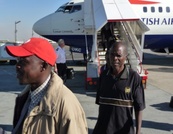
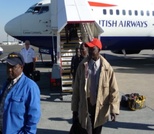
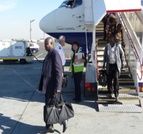
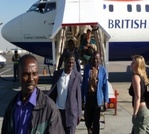
Discussion of the first flight was shared among the group, each one sharing his/her own experience, some even saying, “people exaggerate I did not experience what people were saying”, the discomfort is just on taking off and landing otherwise the flight is good.
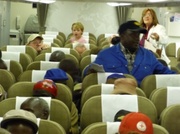
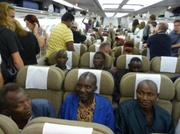
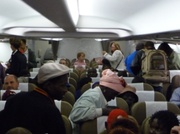
At 20:00 hrs we were settling in the airbus of Swiss airlines for an overnight journey across Africa to Europe. The plane was big and carrying many people and if not mistaken we were 550 on board. 06:50hrs we disembarked in Zurich / Switzerland and headed straight to the third plane which took us to Vienna, the capital city of Austria.
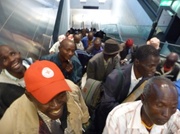
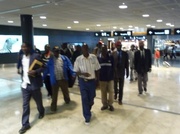
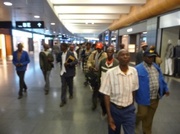
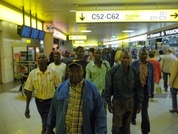
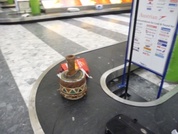
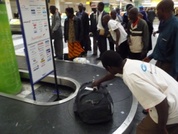
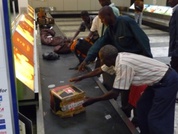
At 8:58 we were in Vienna airport going for luggage collection. We reached the collection point and found the luggage was already at the collection bay, everybody collected what was for the group and
sorted it out to make sure that everything was there. Unfortunately it was found that one bag was missing and - what was more important - inside was the Nyele (horn). We were led outside buy Joachim and Jimmy who were our trip guides from Zambia up to Vienna where they handed us over to Anna and Stefan.
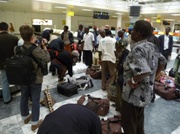
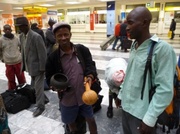
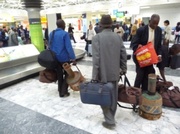
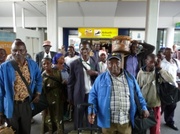
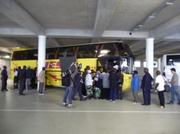
We met them outside waiting for us and were later joined by Sekembuke and Siga from Zanzibar and by the Masterdrummers from Nepal. Then we were on the bus to Linz for 1Hr 30Min. We reached Linz and checked in at our hotel JGH (Junior Youth Hostel).
Thursday the 30th April, the day started with a technical workshop at a place called the KNOWLEDGE CENTER. Photographers, cameramen and sound recorders gathered at the big and beautiful building for preparations of the awaited big event, several programme, techniques and responsibilities were laid down and shared.


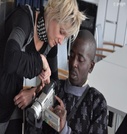

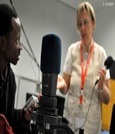
After lunch at 14:07, the three parade locations were visited by bus. Our first site was a place called Solar City which was going to be our first place of performing.
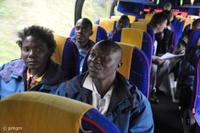
This arrangement was ideal because we were not going to be taken by surprise on the day of the event, because we could have seen the places already. This arrangement was quite good because instead of concentrating on performing we were going to be staring on the beauty and the good architecture work of the city of Linz. As you can see in this picture below everybody did not believe what he was seeing as he looked and compared to what it was back home. This set up of visiting the places before performances really helped us to adapt to the environment and be accustomed to the city and a vision of how we were going to interact among ourselves as we were coming from different countries and speaking different languages.
As you can see in the picture below people stared to the good architectural work of city of Linz
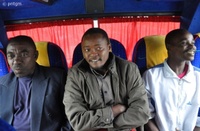
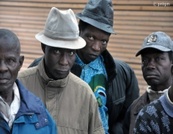
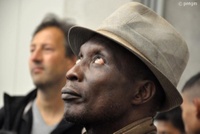

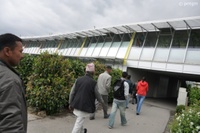
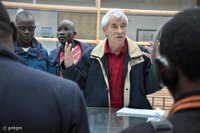
As you can see on far right, the organizer Mr Peter Kuthan was emphasising on this point for youngsters to have access for them to play.
When we reached solar city we were taken around the place. The place has no backyards for youngsters to play or relax, the organisers of the parade were trying to lobby for the parking space which is built underground the shopping mall. We were then taken to see the emphasised parking space which was meant for cars but it is not used, it is just idle, we had to walk down stairs. The parking space was to be filled with music of all kinds to prove to the authority that it was possible for youngsters also to play from the parking area and it was even safe for children.



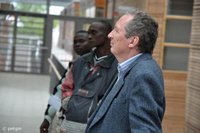
Our next visit was a factory called Rubble Master. At this place was to be our reception for dinner after a performance at Solar City which was going to be our first day of activity.
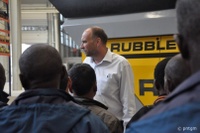
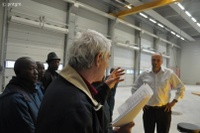
We were introduced to the director of the company who welcomed us and wished us well during our stay. He then promised to meet us the following day at Solar City.
The next site was the harbour. At the harbour, the performances were to be started at different strategic points and end up at Time's Up laboratory. As it is seen on the picture below Mr Kuthan was showing each group its starting point.
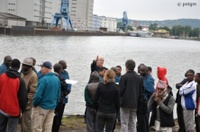
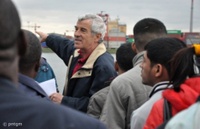
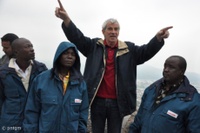
From the harbour we drove up hill to Pöstlingberg. An old church is found on this highland giving a good view to some parts of Linz town. With some good recreation facility, nearby there is a fire station with a railway station passing through. The place was going to stage our day three and the last performance in Linz.
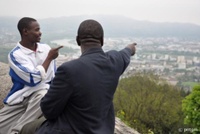
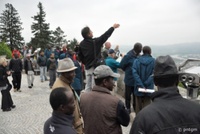
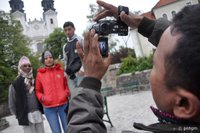
The day ended with a welcome party at Posthof which was hosted by the representative of city of Linz and we had our dinner there. People discussed and mixed, it was the beginning of good time away from home clearing the fears of the flights and thoughts of being in a foreign country.
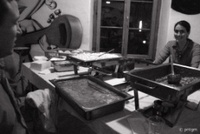
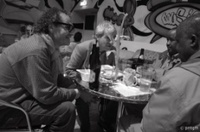
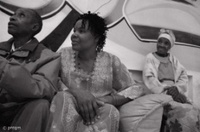
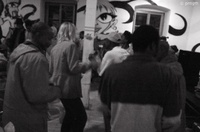
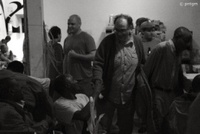
A programme for the whole trip was drawn, among the Simonga-Maliko group people visited different places which were lined up. Others had an opportunity to visit the Botanical garden, the Ars Electronica Centre, the Museum and they also saw what the Danube can offer.
May Day was also a nice thing to observe, which we call Labour Day in Zambia. A colour full march past of all sorts of workers (groups) dressed in different colourful cloths was done on main street and ended at this city square.
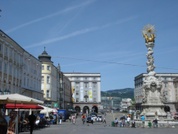
In the afternoon we started off for our first long awaited parade to solarCity by public transport. All the groups were geared to demonstrate their skills to a well organised and most advertised event. When we reached solarCity groups had to divide their starting points, it was a hive of young and old, tall and short not forgetting babies they really wanted to watch this event which doesn’t happen always.
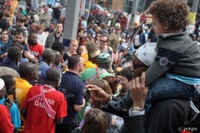

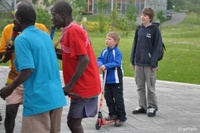
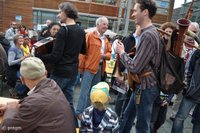
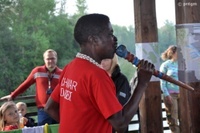
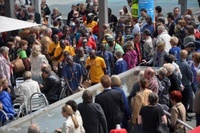
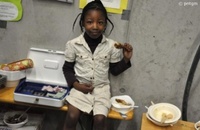

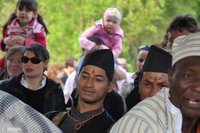
More people popped in as the combination of Sekembuke & Siga, Nyele and the masterdrummers were heard and tuned to best rhythm by the Hornroh Alpin Horn players from Switzerland.
Another interesting part was when the musicians met at the wooden bridge across nearby Weikerlsee with different sounds of music to become one rhythm. (as seen in the picture below)
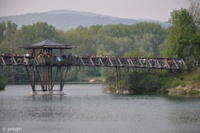
It was a nice experience to see and watch. At the end of this day that’s when I come to know the meaning of the parade. My thoughts were when I saw the input starting from organising, advertising, accommodating and so forth, at SolarCity I was expecting to see people paying for tickets as it is back home, but there was nothing, it was free for everyone with ears to hear and eyes to watch. The day ended at the machinery hall called Rubble Master where we had dinner and a day’s reflections watching a review of the day’s activities on a projector.
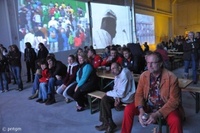
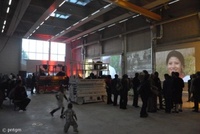
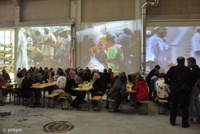
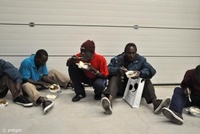
Saturday 2nd May at 14.00hrs we left for our second parade to the harbour. This was a good place giving a memory of the Zambezi river back home, the only difference was that the harbour was friendly with no crocodiles compared to the Zambezi river.
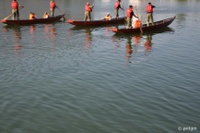
The musicians started from different points and crossed the river using boats to Time's Up as people sat along the banks watching boats, canoes and steam engines with rhythms coming from any direction where you see a boat.
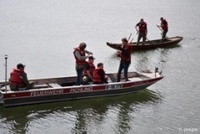
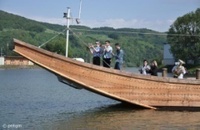
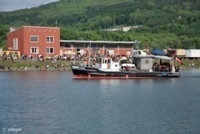
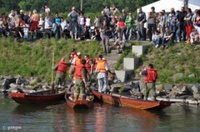
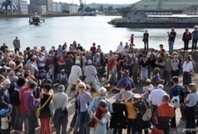
Sunday the 3rd of May on our way to Petrinum I passed through the Zoo, I saw birds and a good number of animal species.
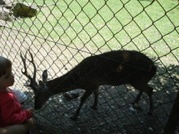
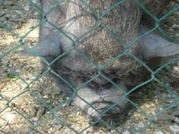
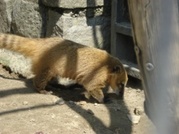
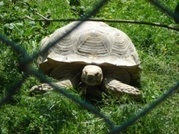
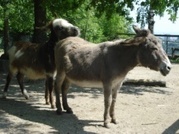
When we reached Petrinum, it was another interesting day climbing up hill from Petrinum to Postlingberg. The rhythm of different kinds of instruments brought the neighbourhood together, old people braved the up hill walk following the sounds. It was nice to see how people appreciated the rhythms. It was really a good experience, the harmony, the integration, the concept, a well organised parade.
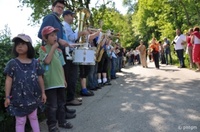
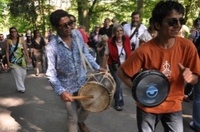

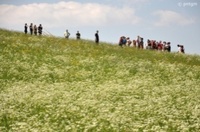
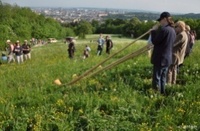
To symbolise and appreciate the parade, when all people reached the final point, people joined hands and danced round while holding each other (mary go round). This was a sign of togetherness despite language difference but in music we interacted without problems.
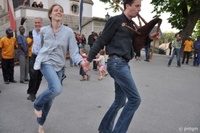
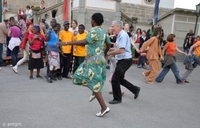
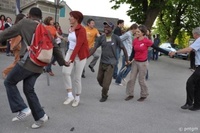
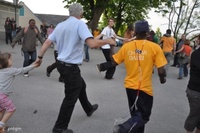
The day ended with a fare well dinner at Freiseder hosted by the City of Linz and Governor of Upper Austria. Meals here were the best, people eat and drunk to their satisfaction.
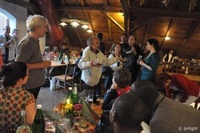
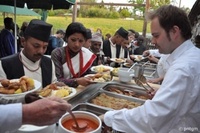
On Monday the 4th May, groups like Hornroh, Donau Brass, and the duo of Albin Paulus left but Masterdrummers, Sekembuke & Siga and Simonga - Maliko had to go to the country side invited by Joachim and Heim.Art.
The following day 5th May part of the group went to Auhof School to interact and learn from each other, a charity concert for solar project was held at Neues Rathaus. The 6th May we departed from the hotel which was our home for 8 days and headed to the Spinning factory Linz Textil before hitting the road to Melk. We were privileged to see how the yarn is processed up to the stage of finished cloth in readiness to make T-shirts.
Melk - one hour and some minutes drive brought us to this beautiful town. In this town the most fascinating apart from the scenario is the majestic Abbey of Melk, which grows on a rocky bluff overlooking the Danube, it is the best of Baroque architecture in Austria. It has origins in the 10 century as the castle of the ruling Babenberger family but become a monastery in 1089 when Markgraf Leopold II donated the building to the Benedictines. Famous for its scholarship, the Abbey has been a spiritual, cultural and intellectual centre for nearly a millennium. The original Abbey was gutted by fire during the Turkish invasion in 1683 and entirely rebuilt from 1802 onward. The outer gateway, giving access to the first courtyard is framed by statues of the abbey patrons St Leopold and St Coloman and flanked by two bastions. On the inner gate is the Abbey coat of arms. Beyond a vestibule with a ceiling painting of St Benedict is the Prelates courtyard a fine group of buildings adorned with statues of the prophets.
The emperors gallery which is 196m or 644ft long, provide access to the chambers reserved for important visitors. Some of these rooms now house a museum which presents the Abbey’s history and its treasures in an engaging and visually appealing fashion using light, sound and such modern media as video installations. The Marble Hall impresses less with its lavishness than with the strength of its design. The undisputed thing here is the ceiling fresco by Paul Troger, which centres on the goddess Athena riding a lion drawn carriage in an allegory of wisdom and enlightenment.
A performance was staged after dinner. People braved the cold and come up hill to watch the Simonga-Maliko and Sekembuke&Siga performances. After music introduction in the hall, the group moved outside the hall, this is when they got the actual sound of the nyele and every body joined in.
From Melk we went to Vienna, an hour drive along the way, where we saw vineyards.
Otto Lechner was our guide and he showed us where he was playing when he was young, how the floods could flood the country side and so on.. While in Vienna we visited the Integrationshaus where we had a good time with the inhabitants of the house. After lunch we interacted in different music from different countries where we come from and danced. By the time of departure people had made friends and it was a sad moment when we had to bid farewell to the house.
Another place of good memories was a vision of back home, a one hour drive to the country side of Vienna at a place called KUNST (IN DER NATURE AM) WACHTBERG, from a simple translation if not mistaken is watching from the top of the hill. This was actually in the bush but very good for mind relaxation but when it was time for the event it was no longer the bush, people come from all over and filled the place, and the parking area was like in Vienna again. People danced, enjoyed themselves till dawn.
Our last performance was at Vienna's Augarten. The place was well organised, especially for the nyele performance it was really ideal because it was an open ground full of nothing but a multitude of people. They liked the screaming of nyele, others could come and try blowing the horns and drumming especially the big drum.
We had another good experience with Joachim, Jimmy and Elke when we went to mix the water of the Zambezi River at the Old Danube River. 14 people went for mixing the water, 7 boats were booked, 2 people were to in each boat.
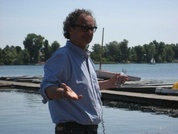
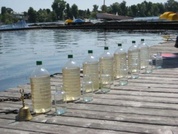
7 bottles of water were shared among us, then off to the middle of the river facing the United Nations Building, the water was poured gradually in the old Danube River.
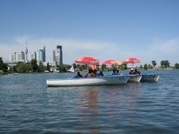
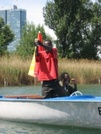
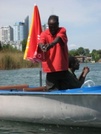
From this point we walked through the Millennium city and saw some old but beautiful buildings, tourists in carriages and university students performing some acrobatics for fundraising.
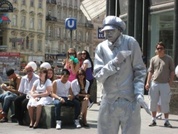
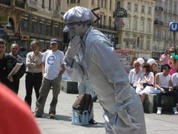
We had our farewell dinner at Palme Café Restaurant hosted by the City of Vienna on Sunday the 10th of May 2009.
The day of departure we went by bus to the airport accompanied by Anna and Peter Kuthan. It was a sad note to say good bye to these people but again good for them, so that they can relax after some long months of preparations to put all the things in place for such a success.
When we reached home, a welcome party was held inviting the Maliko group which remained behind, the jerseys and boots were donated to the surrounding schools, namely Makonkonto Basic School, Siamuyala School, Fisheries School and Sinazongwe Basic School.
This is a sample of what happened below.
Team member Respondent | The Story (raw message) |
Ever Sialumbuka | Quote “I was so overwhelmed for I expected little but learned much. Firstly, I enjoyed the flight, I never dreamed to travel outside the country; I am not educated for what I thought is only educated people fly in aircrafts. I also like Austria as it is a clean place, people there freely interacted with us, no racial discrimination, we were well fed though food is not like ours here but few days later I got used to it. We were so cared for during the traveling and stay in Austria. I liked all the places visited. Back home I received a thunderous welcome from my family. I never dreamed all this extraordinary experience. I wish it comes again” end of quote |
Siamukumbwa S.Benson 60yrs old | Quote “it was an intriguing experience for me to fly in air. I enjoyed the plane, actually three planes one way to Austria. We really enjoyed our stay in that nation. The festival was so nice and our drums combined with melodious sound from the antelope horns, pulled the crowd and no doubt caught attention of the birds. We were no doubt the best. The interactions with all the groups were very good, so organized and admirable. The Austrians are loving people, we were home actually. I really count myself a very lucky man to be among the team who traveled. Taking part in my traditional dance has paid me a lot, so much that I urge the young ones to preserve our dance. All was well arranged for us. I must be there next time” end of quote. |
Siakachela Bedford 62yrs old
| Quote “we went to show our traditional dance there (Austria). There were other many groups from different nations. It was a big festival. We really enjoyed it there. I was happy to interact with other different groups. I liked that it is not only us here preserving our traditional culture but all nations and people. It is not being primitive to take in traditional dances. Look, those who say it is being primordial, have they been taken to other countries? I flew because of blowing the antelope horn. I can’t wait to be there again” end of quote. |
Member’s Question to Answer interview. | Maliko team respondent | |
Q. Has Parade met your expectations? A. “Very much and beyond what I expected especially the token of appreciation”. Q. What did you like / not like? A. “I liked the interaction with other nationals, the welcome was very good, it broke the fear and to me, we were given first class sleeping accommodation. Their cities are clean and I enjoyed the harbour setup. I also enjoyed and admired the technology the have”. Q. What experience can you share? A. “We are not the only tribe in the world keeping old traditions. We were many there and saw that each group was proud of their dance”. Q. How would you suggest the concept of Parade as a special festival? A. “The parade concept is a good one it’s only that resources cannot allow to have all nations’ presentations there especially that most nations like in Africa have many different cultures”. Q. Which music group(s) did you find most interesting to meet? A. “All groups interested me especially all were my first encounter however, the Burkina-Faso group interested me most because they really use own hand made instruments like us”. Q. How would you assess the interaction / communication? A. “We were however constrained in language since English, which we can use when outside Zambia is not commonly used in that nation. Many people would have liked to ask us some questions but language was a barrier. We were not mute however since organizers could communicate with us in English”.
|
Maanje Louis | |
Q. How were food / catering / accommodation / transport arrangements? A. “Nothing to complain; all was beyond our expectations. We are used to thick corn meal porridge but in three days time we were used. Blowing horns and beating our drums needs a lot of energy hence our nshima is always ideal for players”. Q. How was the information and organizational set up? Any problems encountered? A. “It was adequate before, during (on transit) and even after the festival. Things were happening (naturally like) as if God was the one organizing; of course, God is always in control. Everything was on schedule”. Q. How do you assess the response / interest of the audience / public? A. “It was awe-inspiring. You know our dance gets boost up by the audience. The audience somehow participates indirectly. It bores us when there is no applause”. | ||
Agness Siamunyembe, born 1937, the oldest in the Simonga-Maliko group. | Team Member Respondent The oldest lady in the group was from Maliko and this is what she had to say. Quote. “Yes its true that I was the oldest in the group and many people did not believe that I will be going out not even myself did I. I thank that whiteman for thinking of me, as you have seen my age may be that is why God was still keeping me for, he wanted me to see where the whitemen come from; so any time now I may die but die as a happy person but before I die, among the stories I can narrate to my grand children it will be the flight, the big planes, bigger than the bus and very comfortable. We were fed nicely though we carried our mealie meal for Nshima we did not eat as we thought because all the time we were satisfied. Those people are honest, no conductor in their buses. The thing which interested me most was the underground train when we went for supper that day I did not know things can happen underground apart from mining.” | |
Story From Team Member | Team Member Respondent | |
Siamuchiliba Ellison 42yrs old | I talked to Ellison Siamuchiliba the man who plays the biggest drum on what he had to say about the tour and the dance. He had this to say; “I really enjoyed being in Austria, the travel (flight), nice accommodation and interactions with other nationals. I enjoy our traditional dance especially my big drum I play it. It is heavy to lift but when in happy mood during the actual war dance, I do not feel its weight. The other thing I appreciated was the out of pocket allowances we received. We went to play and we were appreciated with what we least expected. It was a big relief for my family and me, because I managed to buy a cow and roof the house with iron sheets. I hope this opportunity comes my way again.” | |
BACK HOME Appreciating the go team when it was back, a special welcoming event to hear the feedback was organized. The community back organized a one-day war dance entertainment to welcome the go-team from Austria. The go-team shared their experience in Austria and shared the gifts brought to their schools. These (gifts) were sporting attire. The three schools were given. The District Education Officer and the three school managers were at hand to receive the gift. The community gave the go-team a thunderous welcome, a thing the go-team least expected for they thought others left behind were disgruntled. “Opportunity comes to everyone as God allows it to be,” was the saying from the community. They were all happy that their community is now known (marketed) outside the country and playing Nyele can really take somebody far! | The welcoming dance for the go team (below)
Women out numbered men on the welcoming party. It was inspiring and showed team work in the community. | |
|
The parade was a nice experience to see and to learn from. The setup was very nice especially the harbour though well advertised in print media. The starting point on top of the factory was another advert it really brought people from far to come and see what the noise was just to find it was good music from different parts of the world and the river also contributed to disseminate the sound because sound travels far on water. Transport and time was well managed because everybody had ample time to do things on his spare time and travel using the tickets we were given. The buses we used were first class. Our instruments were being carried using other transport giving us freedom and comfort in the bus or on public transport.
Food. We carried mealie meal but it was not utilized to people’s expectation, they enjoyed the Austrian food and Nshima was abandoned. We enjoyed the Austrian food wherever we were invited, the reception, the food itself was good, a memory to Freiseder - it was the best. Accommodation was good, starting from Linz, Melk, and Vienna, well arranged though being a busy place as we saw, accommodation was best, and at the forest we really enjoyed seating around the fires watching and dancing all sorts of music. All the groups did their best but I was carried with the Masterdrummers. Interaction. I was pleased to be introduced to the radio FRO crew at the studio; I also met Mariana from ORF, Marc, Stephan, Tumler, Puntigam, Uschi, and the crew which covered the Parade. Thanks to the organizers who made the parade to be a success, most sincerely to the Kuthans for their efforts to ensure that the parade goes as planned, all the sponsors not forgetting the owner of the donkey and the donkey indeed, it played a good part on that uphill walk to Postlingberg, Rubble master Management and Time's Up, the governors for throwing a party for us, the Integration family (House), the Kunst am Wachtberg management, the factory management, the artists, not forgetting Jimmy, Joachim, Elke and Puntigam for the photos. The list will not end by not thanking Ingo, Sandra and Hannelore for the time they spent with me and sight seeing the beauty of mother nature Austria.
|
Indeed, I conquer with the Austrian National Anthem as it is saying:
"Land of mountains, Land on the river, Land of the fields,
Land of cathedrals, Land of hammers, rich in outlook!
You are the native home of great sons,
A people uniquely gifted for the beautiful,
Much applauded Austria."

